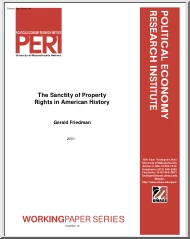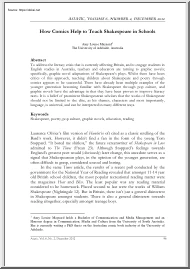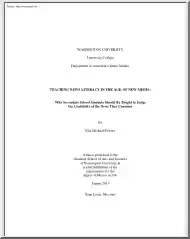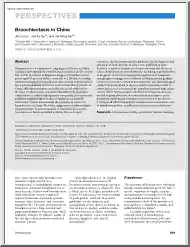Please log in to read this in our online viewer!
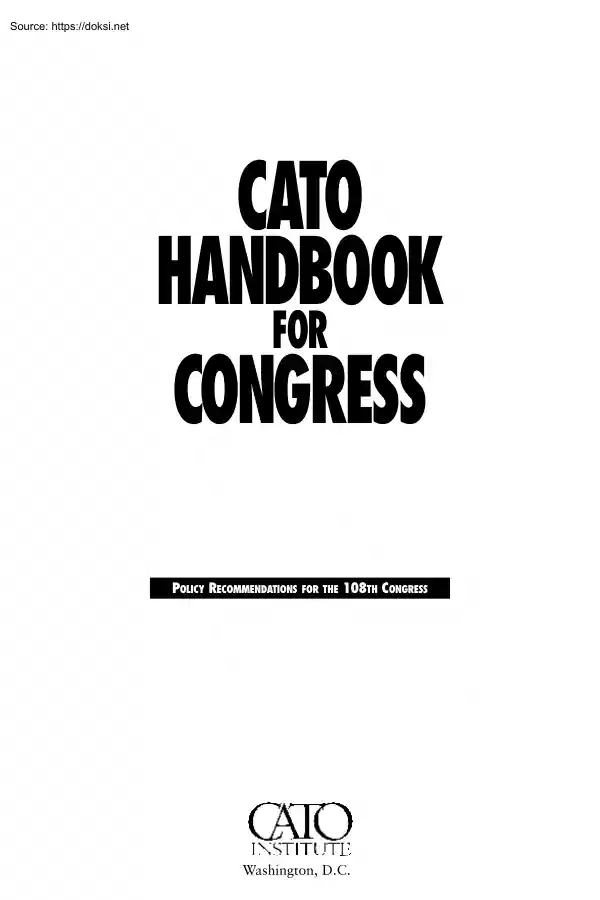
Please log in to read this in our online viewer!
No comments yet. You can be the first!
What did others read after this?
Content extract
CATO HANDBOOK FOR CONGRESS POLICY RECOMMENDATIONS FOR THE 108TH CONGRESS Washington, D.C 58. The Israeli-Palestinian Conflict Congress should resist calls for increased U.S diplomatic efforts to resolve the Israeli-Palestinian conflict; oppose U.S ‘‘nation-building’’ undertakings in the Palestinian territories; reject proposals to dispatch U.S troops as part of international peacekeeping forces in the Palestinian territories; support efforts by Arab states and the European Union to help resolve the Israeli-Palestinian conflict; phase out all U.S military and economic aid programs for Israel, while forgiving repayment of past military loans; terminate all financial assistance to the Palestinian Authority; and consider replacing the current interventionist policy in the Mid- dle East with a policy of ‘‘constructive disengagement.’’ President Bush’s June 24, 2002, address on the Middle East situation disappointed critics at home and abroad who
chastise the White House for failing to ‘‘do something’’ to bring an end to the conflict between Israelis and Palestinians. Those critics have accused the Bush administration of being disengaged from that conflict and suggested that the administration’s low-key approach helped to produce the current violence and brought about an erosion in U.S ‘‘leadership’’ Washington, they argue, should adopt an activist role aimed at forcing Israel to withdraw from the West Bank and Gaza and creating the conditions for the establishment of an independent Palestinian state. Although President Bush did promise in the address to work with other players to create a Palestinian state within three years, he refrained from committing Washington to a step-by-step peacemaking process and resisted 587 CATO HANDBOOK FOR CONGRESS calls to pressure Israel. Instead, he suggested that it was the bankrupt Palestinian leadership and its support for terrorism that were responsible for the
failure to establish an independent state. The president’s address fell short of the expectations of observers who wanted Washington to help restart Israeli-Palestinian negotiations. It did, however, propose a combined strategy of nation building and peacemaking, drawing Washington into new commitments to reform the Palestinian Authority and to select a Palestinian leadership that would make peace with Israel under American supervision. A formal effort to create a Westernized Palestine living in peace with Israel is expected to follow military action in Iraq by the United States and seems to be part of an ambitious undertaking to bring peace and stability to the Middle East and make it safe for democracy. The central problem with the Bush plan is the incompatibility of its drive to establish democracy in the Palestinian territories and its goal of maintaining U.S strategic interests in the Middle East by making peace between Israelis and Palestinians. Free elections in the
Palestinian territories are likely to elevate to power forces that would be opposed to peace with Israel, even given the more moderate positions of the Israel Labor Party. An American crusade for democracy in a new Palestinian state would only help to erode the fragile foundations of Washington’s realpolitik goals of a U.S-backed Palestinian-Israeli agreement. Instead of trying to implement impractical Wilsonian goals in the Holy Land and the entire Middle East, which would force the United States to assume imperial commitments in that region, officials and lawmakers should consider an alternative policy of ‘‘constructive disengagement,’’ which might include incentives for the creation of regional military and economic arrangements in which the European Union played an expanded role. Washington should reject demands to internationalize the conflict between Israelis and Palestinians, which assume that the United States should and would be responsible for resolving it and
paying the costs involved. Instead, the Bush administration and Congress should encourage the process of ‘‘localizing’’ what is in essence a civil war. Such a policy fits with U.S national security interests and would also be more conducive to resolving the conflict. This argument for gradual U.S disengagement from the Middle East and ‘‘localizing’’ the Palestinian-Israeli conflict runs contrary to the conventional wisdom in Washington. The bloody images of Palestinian terrorism and Israeli reprisals that are being constantly broadcast by the television 588 The Israeli-Palestinian Conflict networks create pressure on the White House to project American leadership and help end the horrific violence. The New York Times and other leading U.S publications quote Middle East experts lashing out at President Bush for failing to come up with a peacemaking strategy and warn of the dire consequences of American inaction. Some of them even propose sending U.S troops to
guarantee a border between Israel and a new Palestinian state. But those pundits have yet to come up with a rationale for placing the Israeli-Palestinian conflict at the top of U.S foreign policy priorities. Or, to put it differently, they should explain to the American people why benign neglect of that conflict would have an adverse effect on core U.S national interests Hyperactive U.S diplomacy toward Arab-Israeli conflicts could arguably have been justified in the context of the Cold War, as a way of containing Soviet expansionism in the region and securing Western access to its oil resources. But today there is no global ideological and military power threatening to exploit Arab-Israeli tensions as part of a strategy to dominate the Middle East, and the global energy supply is determined mostly by market considerations. Israel has made peace and established diplomatic relations with its former Arab enemies, Egypt and Jordan, and has the military capability, including a nuclear
arsenal, to deter Syria, Iraq, and Iran. The Arab-Israeli conflict thus has been ‘‘deinternationalized’’ and transformed into a civil war between Jews and Arabs over the control of the territory of Israel and Palestine, including Jerusalem. The war, with its national, ethnic, and religious dimensions, is clearly a human tragedy, butlike the conflicts between Azeris and Armenians and Serbs and Albaniansit must be solved by the groups involved. The United States can and should express diplomatic support for the peaceful resolution of such conflicts and for the creation of strong civil societies, but we must be aware of the limits of our influence. Americans who contend that the United States has a moral obligation to bring an end to the bloodshed should recognize that pro-peace factions in Israel and the Palestinian territories are rather weak. Both sides are willing to pay the costs of what they regard as a fight for survival, and there is no reason why the Americans should save
them from themselves. Not unlike other civil wars, this one will end whenand only when the sides are exhausted and conclude that their interests would be served more effectively around the negotiating table than on the battlefield. In the meantime, there are no indications that the war in the Holy Land will spill over into a regional Arab-Israeli war and affect U.S interests, 589 CATO HANDBOOK FOR CONGRESS since, unlike the situation during the 1973 Mideast War, the Arab governments lack both the military power to defeat Israel and the diplomatic and economic ability to threaten American interests. Thus, like that of most other ethnic and religious conflicts, the impact of the Israeli-Palestinian dispute on U.S national interests is limited Arab governments, including those of Egypt and Jordan, which have embassies in Tel-Aviv, may sympathize with the Palestinian cause, but they lack the power to militarily challenge Israel. Low energy prices make it impossible for them to reapply
the so-called oil weapon. And without the aid of any new geostrategic great power interested in checkmating Washington, they are now playing a weak diplomatic hand as they try to help the Palestinians reinternationalize the conflict with Israel. The Arab ‘‘allies’’ of the United States, including Saudi Arabia and Egypt, argue that Washington is obligated to come to the rescue of the Palestinians. But they should not expect the United States to ‘‘deliver’’ Israel. Instead of complaining about the failure of the United States to make peace in the Holy Land, and warning Americans of the dire consequences of a low diplomatic profile, Egypt, Jordan, and Saudi Arabia should recognize that it is in their national interests and that of the long-term stability of the region to do something to resolve the Israeli-Palestinian conflict in a regional context. After all, it was a process of direct negotiations between Israelis and Palestinians, without any direct U.S involvement,
that led to the signing of the Oslo Agreement (and later the peace accord between Jordan and Israel). Conversely, it was the attempt by the Clinton administration to interject itself into the Palestinian-Israeli negotiations, leading to the 2001 Camp David talks, that helped create the conditions for the outbreak of the current intifada (uprising). By rushing into the Camp David summit, determined to resolve in a few days what are profound and long-standing differences, President Clinton created unrealistic expectations and found himself siding with Israel on the issue of Jerusalem, where no U.S national interest is at stake. All Clinton accomplished was to provoke an antiAmerican backlash in the Arab world If anything, the growing conflict in Israel and rising anti-American sentiment in the Arab world suggest that it is time to turn Washington’s traditional diplomatic strategy on its head. As demonstrated by the outcome of recent U.S efforts in the region, US diplomatic activism
doesn’t secure regional stability. Rather, it tends to intensify ethnic and religious animosities and harden opposition to the United States. Even during the 590 The Israeli-Palestinian Conflict Cold War, when Washington attempted to help mediate the conflict between Arabs and Israelis, its efforts proved successful during the 1979 Egyptian-Israeli peace talks only when the two sides agreed in advance to resolve their differences. Conversely, when the United States tried to intervene diplomatically and militarily in the Israeli-Palestinian war in Lebanon in the early 1980s, the move produced devastating effects on U.S interests, including a dramatic increase in anti-American terrorism But a policy of ‘‘localizing’’ the Palestinian-Israeli conflict should not be equated with a U.S ‘‘green light’’ to Israel to continue with its occupation and colonization of the Palestinian territories A process of US disengagement from the Middle East should set the stage for the
United States to reassess its relationship with Israel and, in particular, to reconsider whether the huge military and economic aid that Washington is providing Israel serves U.S strategic interests US military assistance for Israel not only provides it with incentives to adopt policies that ignite anti-American sentiments among Arabs but also runs contrary to Israel’s own interest of integrating itself into the Middle East. And the annual economic aid package to Israel only helps to subsidize that country’s statist economy. In the short run, Washington should at least cut economic aid to Israel by the amount of money Israel spends on building settlements in the occupied territories and condition military aid on Israel’s agreement to stop using American-made weapons against civilians. At the same time, Washington should terminate financial assistance to the Palestinian Authority. In the long run, a normalization of the US relationship with Israel should include the elimination of
aid to that country. That step would create an incentive for Israel to reform its sluggish economy and integrate itself politically into the region. Israel could play an active role in regional military and economic arrangements and strengthen ties with the European Union. In fact, the United States should not resist but welcome the EU’s playing a more activist diplomatic, military, and economic role in the Middle East especially EU initiatives to help mediate the Palestinian-Israeli conflict. With its geographical proximity to the Middle East, its dependence on energy supplies from the Persian Gulf, and its close economic and demographic ties to the region, including a large community of Arab immigrants, the EU should be expected to replace the United States as the leading global military player in the region. If it extracted itself from diplomatic entanglements and military commitments in the Middle East and normalized its relationship with Israel, the United States might be
welcomed into the region as a trustworthy friend and economic partner. 591 CATO HANDBOOK FOR CONGRESS Suggested Readings Friedman, Thomas. From Beirut to Jerusalem New York: Anchor, 1990 Fromkin, David. A Peace to End All Peace: The Fall of the Ottoman Empire and the Creation of the Modern Middle East. New York: Owl Books, 2001 Hadar, Leon T. ‘‘Extricating America from Its Middle Eastern Entanglement’’ Cato Institute Policy Analysis no. 154, June 12, 1991 . ‘‘The Green Peril: Creating the Islamic Fundamentalist Threat’’ Cato Institute Policy Analysis no. 177, August 27, 1992 . Quagmire: America in the Middle East Washington: Cato Institute, 1992 . ‘‘The Real Lesson of the Oslo Accord: Localize the Arab-Israeli Conflict’’ Cato Institute Foreign Briefing no. 31, May 9, 1994 Morris, Benny. Righteous Victims: A History of the Zionist-Arab Conflict, 1881–1999 New York: Knopf, 2001. Richman, Sheldon L. ‘‘Ancient History: US Conduct in the Middle East since
World War II and the Folly of Intervention.’’ Cato Institute Policy Analysis no 159, August 16, 1991. Segev, Tom. One Palestine, Complete: Jews and Arabs under the British Mandate New York: Owl Books, 2001. Shlaim, Avi. The Iron Wall: Israel and the Arab World New York: WW Norton, 2001 Prepared by Leon T. Hadar 592
chastise the White House for failing to ‘‘do something’’ to bring an end to the conflict between Israelis and Palestinians. Those critics have accused the Bush administration of being disengaged from that conflict and suggested that the administration’s low-key approach helped to produce the current violence and brought about an erosion in U.S ‘‘leadership’’ Washington, they argue, should adopt an activist role aimed at forcing Israel to withdraw from the West Bank and Gaza and creating the conditions for the establishment of an independent Palestinian state. Although President Bush did promise in the address to work with other players to create a Palestinian state within three years, he refrained from committing Washington to a step-by-step peacemaking process and resisted 587 CATO HANDBOOK FOR CONGRESS calls to pressure Israel. Instead, he suggested that it was the bankrupt Palestinian leadership and its support for terrorism that were responsible for the
failure to establish an independent state. The president’s address fell short of the expectations of observers who wanted Washington to help restart Israeli-Palestinian negotiations. It did, however, propose a combined strategy of nation building and peacemaking, drawing Washington into new commitments to reform the Palestinian Authority and to select a Palestinian leadership that would make peace with Israel under American supervision. A formal effort to create a Westernized Palestine living in peace with Israel is expected to follow military action in Iraq by the United States and seems to be part of an ambitious undertaking to bring peace and stability to the Middle East and make it safe for democracy. The central problem with the Bush plan is the incompatibility of its drive to establish democracy in the Palestinian territories and its goal of maintaining U.S strategic interests in the Middle East by making peace between Israelis and Palestinians. Free elections in the
Palestinian territories are likely to elevate to power forces that would be opposed to peace with Israel, even given the more moderate positions of the Israel Labor Party. An American crusade for democracy in a new Palestinian state would only help to erode the fragile foundations of Washington’s realpolitik goals of a U.S-backed Palestinian-Israeli agreement. Instead of trying to implement impractical Wilsonian goals in the Holy Land and the entire Middle East, which would force the United States to assume imperial commitments in that region, officials and lawmakers should consider an alternative policy of ‘‘constructive disengagement,’’ which might include incentives for the creation of regional military and economic arrangements in which the European Union played an expanded role. Washington should reject demands to internationalize the conflict between Israelis and Palestinians, which assume that the United States should and would be responsible for resolving it and
paying the costs involved. Instead, the Bush administration and Congress should encourage the process of ‘‘localizing’’ what is in essence a civil war. Such a policy fits with U.S national security interests and would also be more conducive to resolving the conflict. This argument for gradual U.S disengagement from the Middle East and ‘‘localizing’’ the Palestinian-Israeli conflict runs contrary to the conventional wisdom in Washington. The bloody images of Palestinian terrorism and Israeli reprisals that are being constantly broadcast by the television 588 The Israeli-Palestinian Conflict networks create pressure on the White House to project American leadership and help end the horrific violence. The New York Times and other leading U.S publications quote Middle East experts lashing out at President Bush for failing to come up with a peacemaking strategy and warn of the dire consequences of American inaction. Some of them even propose sending U.S troops to
guarantee a border between Israel and a new Palestinian state. But those pundits have yet to come up with a rationale for placing the Israeli-Palestinian conflict at the top of U.S foreign policy priorities. Or, to put it differently, they should explain to the American people why benign neglect of that conflict would have an adverse effect on core U.S national interests Hyperactive U.S diplomacy toward Arab-Israeli conflicts could arguably have been justified in the context of the Cold War, as a way of containing Soviet expansionism in the region and securing Western access to its oil resources. But today there is no global ideological and military power threatening to exploit Arab-Israeli tensions as part of a strategy to dominate the Middle East, and the global energy supply is determined mostly by market considerations. Israel has made peace and established diplomatic relations with its former Arab enemies, Egypt and Jordan, and has the military capability, including a nuclear
arsenal, to deter Syria, Iraq, and Iran. The Arab-Israeli conflict thus has been ‘‘deinternationalized’’ and transformed into a civil war between Jews and Arabs over the control of the territory of Israel and Palestine, including Jerusalem. The war, with its national, ethnic, and religious dimensions, is clearly a human tragedy, butlike the conflicts between Azeris and Armenians and Serbs and Albaniansit must be solved by the groups involved. The United States can and should express diplomatic support for the peaceful resolution of such conflicts and for the creation of strong civil societies, but we must be aware of the limits of our influence. Americans who contend that the United States has a moral obligation to bring an end to the bloodshed should recognize that pro-peace factions in Israel and the Palestinian territories are rather weak. Both sides are willing to pay the costs of what they regard as a fight for survival, and there is no reason why the Americans should save
them from themselves. Not unlike other civil wars, this one will end whenand only when the sides are exhausted and conclude that their interests would be served more effectively around the negotiating table than on the battlefield. In the meantime, there are no indications that the war in the Holy Land will spill over into a regional Arab-Israeli war and affect U.S interests, 589 CATO HANDBOOK FOR CONGRESS since, unlike the situation during the 1973 Mideast War, the Arab governments lack both the military power to defeat Israel and the diplomatic and economic ability to threaten American interests. Thus, like that of most other ethnic and religious conflicts, the impact of the Israeli-Palestinian dispute on U.S national interests is limited Arab governments, including those of Egypt and Jordan, which have embassies in Tel-Aviv, may sympathize with the Palestinian cause, but they lack the power to militarily challenge Israel. Low energy prices make it impossible for them to reapply
the so-called oil weapon. And without the aid of any new geostrategic great power interested in checkmating Washington, they are now playing a weak diplomatic hand as they try to help the Palestinians reinternationalize the conflict with Israel. The Arab ‘‘allies’’ of the United States, including Saudi Arabia and Egypt, argue that Washington is obligated to come to the rescue of the Palestinians. But they should not expect the United States to ‘‘deliver’’ Israel. Instead of complaining about the failure of the United States to make peace in the Holy Land, and warning Americans of the dire consequences of a low diplomatic profile, Egypt, Jordan, and Saudi Arabia should recognize that it is in their national interests and that of the long-term stability of the region to do something to resolve the Israeli-Palestinian conflict in a regional context. After all, it was a process of direct negotiations between Israelis and Palestinians, without any direct U.S involvement,
that led to the signing of the Oslo Agreement (and later the peace accord between Jordan and Israel). Conversely, it was the attempt by the Clinton administration to interject itself into the Palestinian-Israeli negotiations, leading to the 2001 Camp David talks, that helped create the conditions for the outbreak of the current intifada (uprising). By rushing into the Camp David summit, determined to resolve in a few days what are profound and long-standing differences, President Clinton created unrealistic expectations and found himself siding with Israel on the issue of Jerusalem, where no U.S national interest is at stake. All Clinton accomplished was to provoke an antiAmerican backlash in the Arab world If anything, the growing conflict in Israel and rising anti-American sentiment in the Arab world suggest that it is time to turn Washington’s traditional diplomatic strategy on its head. As demonstrated by the outcome of recent U.S efforts in the region, US diplomatic activism
doesn’t secure regional stability. Rather, it tends to intensify ethnic and religious animosities and harden opposition to the United States. Even during the 590 The Israeli-Palestinian Conflict Cold War, when Washington attempted to help mediate the conflict between Arabs and Israelis, its efforts proved successful during the 1979 Egyptian-Israeli peace talks only when the two sides agreed in advance to resolve their differences. Conversely, when the United States tried to intervene diplomatically and militarily in the Israeli-Palestinian war in Lebanon in the early 1980s, the move produced devastating effects on U.S interests, including a dramatic increase in anti-American terrorism But a policy of ‘‘localizing’’ the Palestinian-Israeli conflict should not be equated with a U.S ‘‘green light’’ to Israel to continue with its occupation and colonization of the Palestinian territories A process of US disengagement from the Middle East should set the stage for the
United States to reassess its relationship with Israel and, in particular, to reconsider whether the huge military and economic aid that Washington is providing Israel serves U.S strategic interests US military assistance for Israel not only provides it with incentives to adopt policies that ignite anti-American sentiments among Arabs but also runs contrary to Israel’s own interest of integrating itself into the Middle East. And the annual economic aid package to Israel only helps to subsidize that country’s statist economy. In the short run, Washington should at least cut economic aid to Israel by the amount of money Israel spends on building settlements in the occupied territories and condition military aid on Israel’s agreement to stop using American-made weapons against civilians. At the same time, Washington should terminate financial assistance to the Palestinian Authority. In the long run, a normalization of the US relationship with Israel should include the elimination of
aid to that country. That step would create an incentive for Israel to reform its sluggish economy and integrate itself politically into the region. Israel could play an active role in regional military and economic arrangements and strengthen ties with the European Union. In fact, the United States should not resist but welcome the EU’s playing a more activist diplomatic, military, and economic role in the Middle East especially EU initiatives to help mediate the Palestinian-Israeli conflict. With its geographical proximity to the Middle East, its dependence on energy supplies from the Persian Gulf, and its close economic and demographic ties to the region, including a large community of Arab immigrants, the EU should be expected to replace the United States as the leading global military player in the region. If it extracted itself from diplomatic entanglements and military commitments in the Middle East and normalized its relationship with Israel, the United States might be
welcomed into the region as a trustworthy friend and economic partner. 591 CATO HANDBOOK FOR CONGRESS Suggested Readings Friedman, Thomas. From Beirut to Jerusalem New York: Anchor, 1990 Fromkin, David. A Peace to End All Peace: The Fall of the Ottoman Empire and the Creation of the Modern Middle East. New York: Owl Books, 2001 Hadar, Leon T. ‘‘Extricating America from Its Middle Eastern Entanglement’’ Cato Institute Policy Analysis no. 154, June 12, 1991 . ‘‘The Green Peril: Creating the Islamic Fundamentalist Threat’’ Cato Institute Policy Analysis no. 177, August 27, 1992 . Quagmire: America in the Middle East Washington: Cato Institute, 1992 . ‘‘The Real Lesson of the Oslo Accord: Localize the Arab-Israeli Conflict’’ Cato Institute Foreign Briefing no. 31, May 9, 1994 Morris, Benny. Righteous Victims: A History of the Zionist-Arab Conflict, 1881–1999 New York: Knopf, 2001. Richman, Sheldon L. ‘‘Ancient History: US Conduct in the Middle East since
World War II and the Folly of Intervention.’’ Cato Institute Policy Analysis no 159, August 16, 1991. Segev, Tom. One Palestine, Complete: Jews and Arabs under the British Mandate New York: Owl Books, 2001. Shlaim, Avi. The Iron Wall: Israel and the Arab World New York: WW Norton, 2001 Prepared by Leon T. Hadar 592
